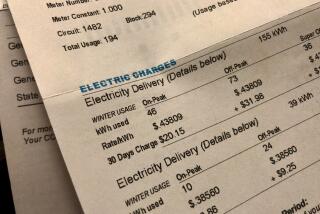PG&E; Judge Bars Panel of Customers
- Share via
SAN FRANCISCO — In a decision that outraged consumer groups, a judge ruled Friday that Pacific Gas & Electric Co.’s 4 million customers are not legally entitled to a separate ratepayers committee that would represent their interests in the utility’s bankruptcy case.
Judge Dennis Montali said bankruptcy law does not give ratepayers special standing in the case, even though the public stake is huge in the financial reorganization of PG&E; and its continued ability to deliver power to Northern and Central California.
Montali concluded that ratepayers have other means to protect their interests. “The Bankruptcy Code, and the Bankruptcy Court, were designed to resolve debtor-creditor problems,” he wrote. “State agencies are where issues such as rates for electricity are handled.”
The judge ruled for PG&E; and against U.S. Trustee Linda Ekstrom Stanley, who argued that ratepayers need special representation because the state attorney general has failed to weigh in to protect the public’s interest.
“We’re disappointed in the judge’s ruling,” Stanley said later, “because we were within our discretion to appoint a ratepayers committee.”
Stanley said she will review the decision before deciding whether to challenge the ruling.
The dispute was an early twist in the remarkable bankruptcy case opened on April 6 when PG&E; filed for Chapter 11 protection from creditors, declaring it had $9 billion in debt. Few utilities have filed for bankruptcy, and perhaps no case has unfolded amid so much economic and political turmoil.
Stanley named an 11-member committee to represent thousands of PG&E; creditors. Then she seated a nine-member ratepayer committee, including business associations and consumer groups, to represent the utility’s customers.
Her action was opposed by PG&E;, the creditors committee and others. The Greenlining Institute, a statewide coalition of poor and minority groups, mounted a protest this week, saying four of its representatives should be seated on the ratepayer panel.
Calling appointment of a ratepayers committee “a slippery slope,” PG&E; counsel James Lopes argued Friday that customers are not creditors or security holders who are covered by bankruptcy law. “Does this mean we have 4 million creditors that we have to classify and deal with?” he asked.
Robert Moore, attorney for the creditors committee, expressed concern that a ratepayers committee would transform the case into a “political town hall meeting.”
The trustee’s attorney, Patricia Cutler, contended that ratepayers need to be represented because they have “the largest stake . . . in the ultimate outcome of this reorganization.”
Even if the attorney general were to intervene, Cutler said, there is a conflict between the state’s interests as a purchaser of power and the utility customers. “Ratepayers need a consistent voice” in the case, she added.
In a letter to Stanley on Thursday, Atty. Gen. Bill Lockyer said, “PG&E; should not be allowed to close the door on ratepayer participation.”
Lockyer spokeswoman Sandra Michioku said the attorney general’s office has stayed out of the case to avoid losing sovereign immunity from being sued in federal court.
“There are many other forums in which to seek to protect the interests of Californians,” she said.
Consumer groups and advocates for the poor denounced the ruling.
Harvey Rosenfield of the Foundation for Taxpayers and Consumer Rights said, “It is unfathomable that the judge would leave ratepayers unrepresented as lawyers for PG&E; and energy companies demand that ratepayers be forced to foot the bill for their greed and incompetence.”
PG&E; officials said they were pleased with the ruling. “The company does not object to ratepayers having a voice in the process relating to matters where they have an interest,” a company statement said.
More to Read
Inside the business of entertainment
The Wide Shot brings you news, analysis and insights on everything from streaming wars to production — and what it all means for the future.
You may occasionally receive promotional content from the Los Angeles Times.










